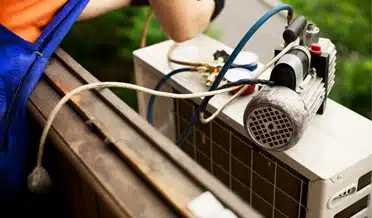6 Most Common Residential AC Repair Issues
Residential AC Repair
Walking out of the summer heat into an air-conditioned space is a special feeling; it might elicit a deep sigh while crossing the threshold. When you step into that same space, expecting comfort and being disappointed will elicit a groan. A little bit of panic might grip you if your AC fails at home.
Instead of panic, let us suggest a few action steps to help you diagnose the problem and assist the repair technician upon arrival.
- Step one, check the thermostat. The wall-mounted switch calls for cooling when the temperature climbs above a preferred setting. If the thermostat screen is blank, a battery might be the fix you need. Someone might have bumped the thermostat up a few degrees for personal comfort. Start with the thermostat.
- Step two, check the circuit breaker. The air conditioner is one of only a few appliances that are hard-wired directly from the service panel. Flipping a circuit breaker might restore the cool air, but it might also be an indicator of a larger problem.
- Step three, check the air filter. A clogged air filter can reduce enough airflow through the evaporator chamber to decrease cooling.
An HVAC Residential AC Repair professional will investigate the entire system to determine the problem(s) that is keeping your home warmer than desired. Common Residential AC Repair problems they might find include:
- Check the thermostat and power connections, verifying your findings.
- Check the air filter and general maintenance of the system.
- Low or no refrigerant. The tech will check the gas pressure. Refrigerant gas operates under high pressure and gas under pressure will find weaknesses and flows to try to escape. Low gas reduces the cooling capacity of the system. That could be the problem.
- Ice build-up on the evaporator coil. The evaporator removes humidity from the air while cooling the air destined for your home. Several problems can lead to moisture freezing on the coil instead of dripping down to the drain pan.
- Component failure. The condenser, compressor, and blower motor are the major air conditioner components that will be carefully inspected.
- Electrical controls and sensors. Your AC system uses very complex switches, capacitors, and temperature sensors.
The professional team of Residential AC Repair technicians at AllCool has vocational training, on-the-job training, and years of experience in inspecting and repairing air conditioners of various makes. It is unlikely that you will face a problem that our team has not corrected several times. We are committed to restoring comfort to your home and family.
Have Indoor Air Quality Issues?
Schedule your Residential AC Repair assessment by calling AllCool AC & Heating at 281-238-9292 or contact us via email.
